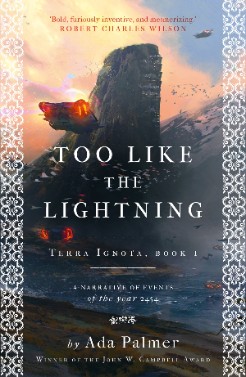You will criticize me, reader, for writing in a style six hundred years removed form the events I describe, but you came to me for explanation of those days of transformation which left your world the world it is, and since it was the philosophy of the Eighteenth Century, heavy with optimism and ambition, whose abrupt revival birthed the recent revolution, so it is only in the language of the Enlightenment, right with opinion and sentiment, that those days can be described. You must forgive me my ‘thee’s and ‘thou’s and ‘he’s and ‘she’s, my lack of modern words and modern objectivity. It will be hard at first, but whether you are my contemporary still awed by the new order, or an historian glazing back at my Twenty-Fifth Century as remotely as I gaze back on the Eighteenth, you will find yourself more fluent in the language of the past than you imagined; we all are.
I wondered once why authors of ancient days so often prostrate themselves before their audience, apologize, beg favors, pray to the reader as to an Emperor as they explain their faults and failings; yet, with my work barely begun, I find myself already in need of such obsequies. If I am properly to follow the style I have chosen, I must, at the book’s outset, describe myself, my background and qualifications, and tell you by what chance or Providence it is that the answers you seek are in my hands. I beg you, gentle reader, master, tyrant, grant me the privilege of silence on this count. Those of you who know the name of Mycroft Canner may now set this book aside. Those who do not, I beg you, let me make you trust me for a few dozen pages, since the tale will give you time enough to hate me in its own right.
